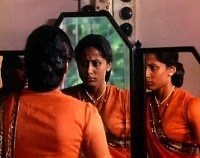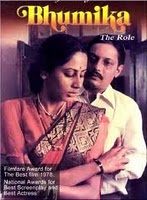
| Previews |
| jbspins.blogspot.com MIAAC ’10: Smita Patil Sidebar November 07, 2010 |
MIAAC ’10: Smita Patil Sidebar Perhaps no actor embodied the challenges of India’s “Parallel Cinema,” or non-Bollywood filmmaking, better than Smita Patil (1955-1986). Though she made commercial movies as well, she is more closely associated with more independent art-films from the likes of Satyajit Ray and Shyam Benegal (who discovered her). Yet, one of her best-loved performances was a Bollywood-style Marathi actress. A pioneering Indian feminist, Patil’s daring work, controversial life, and tragic early death make her a perfect subject for a retrospective sidebar of the 2010 Mahindra Indo-American Arts Council Film Festival, co-presented with the Film Society of Lincoln Center. Perhaps no actor embodied the challenges of India’s “Parallel Cinema,” or non-Bollywood filmmaking, better than Smita Patil (1955-1986). Though she made commercial movies as well, she is more closely associated with more independent art-films from the likes of Satyajit Ray and Shyam Benegal (who discovered her). Yet, one of her best-loved performances was a Bollywood-style Marathi actress. A pioneering Indian feminist, Patil’s daring work, controversial life, and tragic early death make her a perfect subject for a retrospective sidebar of the 2010 Mahindra Indo-American Arts Council Film Festival, co-presented with the Film Society of Lincoln Center.The Patil sidebar offers an opportunity to see truly classic films from India often overshadowed by the glitz and glamour of Bollywood. However, Benegal’s Bhumika (The Role) gives viewers a chance to have their Bollywood cake and eat it too. Exploring gender roles and cultural prejudices in early to mid Twentieth Century India, Bhumika still features many lavish musical numbers from the films-within-the-film that Patil’s Usha reluctantly makes under her screen name Urvashi. She never loved the business, not even as a child star, yet her family’s poverty left her little choice. Unfortunately, her work as an actress somewhat compromises Usha, or at least the public perception of her. This also leads to strife with her manager-husband Keshav Darvi, even though it is he who originally pushes her into the business. A much older family associate of dubious character, it is hard to understand why Usha stays with Darvi, yet for personal and cultural reasons, Usha keeps coming back to him. Of course, there are plenty of other men who show an interest in the actress, including Sunil Verma, a married director. While he is a person of substance, his philosophical materialism is not particularly healthy for Usha. Though she finds a surrogate family as the more-or-less concubine of the wealthy Vinayak Kale, the inequalities of their relationship are even more extreme. Bhumika is like A Star is Born for India’s Parallel Cinema, with added elements of scandalous 1980’s mini-series, including abortion, spousal abuse, and plenty of infidelity mixed in for spice. Yet, Benegal gives it all an epic sweep, approximating the look of vintage cinema with his extensive black-and-white flashbacks. A role that clearly hit close to home, Patil projects both intensity and a fragility as Usha. In addition to Patil, many familiar names and faces can be seen in this year’s MIAAC. Perfect as the old rascally government spokesman in Anusha Rizvi’s Peepli Live, one of the better reviewed and widely screened Hindi imports of the year, Naseeruddin Shah is an intriguing presence in Bhumika as Verma. Peepli also featured a catchy soundtrack performed by the world music group Indian Ocean, who are the subject of the documentary Leaving Home. After the triumph of Slumdog Millionaire, Oscar-winning A.R. Rahman is easily the most famous Bollywood compose  r of the day, whose new score graces Mani Ratnam’s Raavanan. The Tamil film also features Aishwarya Rai Bachchan, dubbed by 60 Minutes “the world’s most beautiful woman,” recognizable to followers of Bollywood for Bride and Prejudice and Jodhaa Akbar. r of the day, whose new score graces Mani Ratnam’s Raavanan. The Tamil film also features Aishwarya Rai Bachchan, dubbed by 60 Minutes “the world’s most beautiful woman,” recognizable to followers of Bollywood for Bride and Prejudice and Jodhaa Akbar.The 2010 MIAAC offers an interesting opportunity to compare and contrast the screen personas of Patil and Rai Bachchan, two iconic actresses of Indian cinema, from very different eras. With many films considerable longer than two hours, the sidebar also offers good value for the ticket price. The Patil sidebar runs at the Walter Reade Theater November 11th through the 18th, with Bhumika screening this Thursday (11/11) and the following Wednesday (11/17) and Thursday (11/18). The MIAAC film fest proper begins this Wednesday (11/10) at the SVA Theater. |
| Source: http://jbspins.blogspot.com/2010/11/miaac-10-smita-patil-sidebar.html |